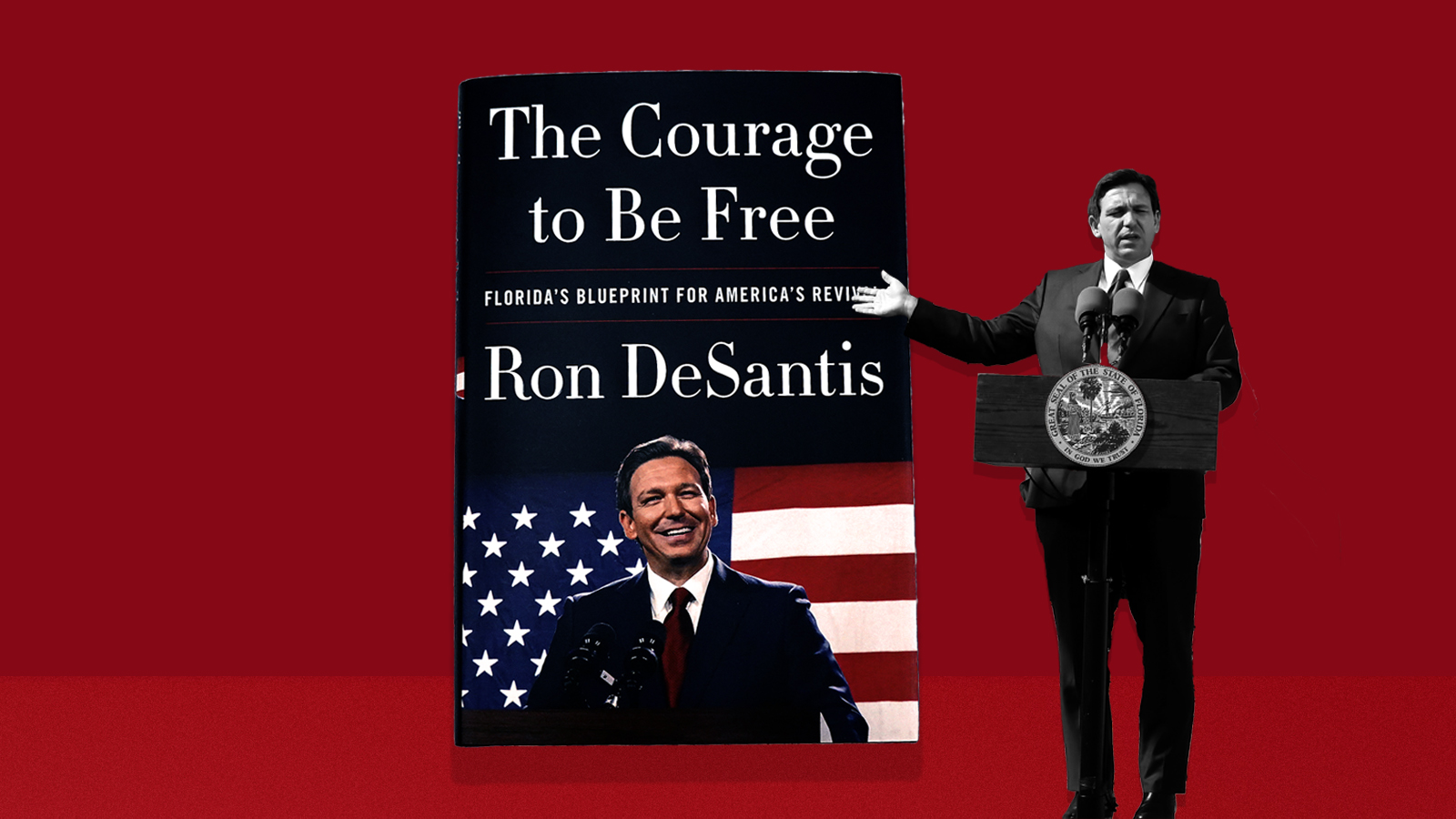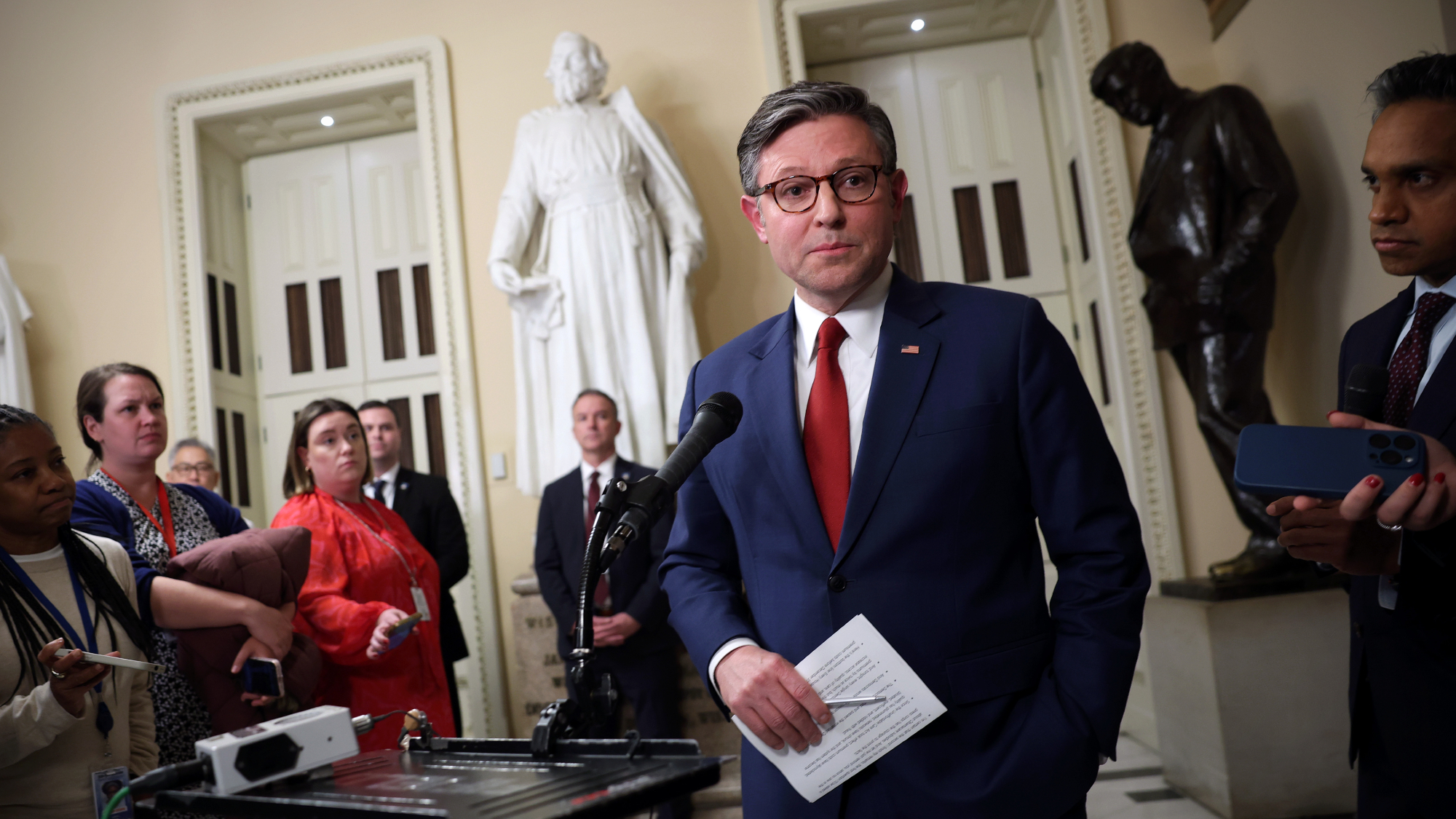The Courage to Be Free: What's in Ron DeSantis' 'chilling' new book?
In his new memoir, the rising Republican "tries to make his message palatable for the national stage"


A free daily email with the biggest news stories of the day – and the best features from TheWeek.com
You are now subscribed
Your newsletter sign-up was successful
It's fairly safe to assume that when a politician releases a memoir, they're not doing so simply to appease their inner sense of authorial merit. Rather, it's helpful to think of these forays into literature as being in service of a lawmaker's broader political aspirations, for which the visibility and financial benefits of high-profile authorship can be leveraged for future electoral gains. Former President Barack Obama launched his nascent political career after first publishing his memoir Dreams from My Father; Hillary Clinton's Hard Choices, an account of her time as secretary of state, preceded her 2016 presidential campaign; and Crippled America: How to Make America Great Again helped propel Donald Trump to the White House that same year. The list goes on.
Now joining the ranks of political memoirists is Florida Gov. Ron DeSantis (R), whose The Courage to Be Free: Florida's Blueprint for America's Revival was released Feb. 28 to financial — if not necessarily critical — acclaim. While DeSantis hasn't officially declared whether he plans to challenge Trump for the 2024 presidential nomination, the very fact that he has chosen this moment to not only publish his overtly political tome but accompany it with a national tour featuring multiple campaign-like stops strongly suggests that he will. And even if he doesn't, the book and national tour will, if nothing else, set up the basic framework of any future run.
Takeaways from The Courage to Be Free
Although the book contains a requisite amount of personal history and narrative, it is by no means a DeSantis autobiography. Instead, it largely "rehashes his contentious four years as governor and suggests he has laid a path for others to follow," CNN summarized after receiving an advance copy. Within those "contentious four years," DeSantis' ongoing feud with the Walt Disney Corporation represents a significant "demarcation line" in his political career, wherein Disney's decision to release a statement opposing the governor's so-called "Don't Say Gay" bill was a "microcosm of a greater struggle between the fight conservatives expect from GOP leaders and the instincts of Republicans not to meddle in the affairs of businesses," the outlet said.
The Week
Escape your echo chamber. Get the facts behind the news, plus analysis from multiple perspectives.

Sign up for The Week's Free Newsletters
From our morning news briefing to a weekly Good News Newsletter, get the best of The Week delivered directly to your inbox.
From our morning news briefing to a weekly Good News Newsletter, get the best of The Week delivered directly to your inbox.
The book also walks a fine line in terms of DeSantis' tenuous relationship with Trump, whom the governor has largely refrained from criticizing directly, despite the latter's more frontal attacks on the man he sees as a major potential threat to his return to the White House. To the extent that Trump is mentioned, "it's mostly in positive terms," The Washington Post noted, adding that DeSantis "finds common cause with Trump in labeling the media 'the enemy of the people,'" while celebrating a number of the former president's more concrete policy wins. But to the extent that DeSantis is using his book to make a case against Trump in any future run, CNN suggested it is done much more subtly than the straightforward name-calling preferred by the former president. Instead, DeSantis opts to juxtapose "his own record compelling Republican lawmakers in his state to act repeatedly in service of his agenda" against Trump's time in office with a GOP majority. "The implication," CNN said, "seems clear."
Aside from focusing his battles with Disney, DeSantis also makes a point of highlighting his coronavirus response as a major episode during his gubernatorial tenure. "When I announced Florida's back to school policy, perhaps because I did so during the height of the summer COVID-19 wave, there was substantial public opposition to my decision," he writes in the copy reviewed by CNN. "For all the controversy that swirled around my decision, and all the incoming fire I took by making it, there was never a doubt in my mind that keeping our schools open was right for our state."
What are the critics saying?
High-profile reviews of The Courage to Be Free have been noticeably downbeat about the book, with The Washington Post's Manuel Roig-Franzia calling it a "scorn-filled" preview of DeSantis' potential campaign. Noting that the governor is conspicuously magnanimous toward Trump, Roig-Franzia writes that "there are so many others to attack, foremost among them America's 'elites,' in all their various forms." By Roig-Franzia's count, "the word 'elite' gets used more than 20 times in the book's introduction, which is 12 pages long."
The New York Times' Jennifer Szalai picked up on a similar dissonance, calling the book the work of "someone who has expended a lot of effort studying which way the wind is blowing in the Republican Party and is learning how to comport himself accordingly." For as much as DeSantis peppers his work with various conservative shibboleths, "all the culture war Mad Libs can't distract from the dull coldness at this book's core." Ultimately, Szalai concluded, "The Courage to Be Free is courageously free of anything that resembles charisma, or a discernible sense of humor."
A free daily email with the biggest news stories of the day – and the best features from TheWeek.com
And in Politico, reviewer Gary Fineout noted that although some biographical omissions are to be expected in these types of political memoirs, "DeSantis' book stands out for the limited amount of personal information he gives readers, especially in the era of oversharing."
Not all critical reactions to the book have been quite so negative, however; the conservative National Review described the memoir as DeSantis "[taking] on GOP Establishment," while the further-right BizPacReview crowed over the fact that it "hit No. 1 on the Top 100 list of Amazon on the first day of its release," which "may be more than some of his critics can take."
What can the book tell us about 2024?
The Courage to Be Free has been widely taken as the opening salvo of an inevitable campaign for the GOP nomination — no matter how much the author himself may try to coyly downplay his intentions thereof. By publishing now, the book "provides DeSantis with an opportunity to tour multiple cities in Florida and as far away as California to boost book sales — and himself," Politico said, noting DeSantis' upcoming plans to tour "New Hampshire, Iowa, and Nevada, all early primary states."
Indeed, The Courage to Be Free seems designed to appeal to voters outside the insulated cocoon DeSantis has established for himself in Florida. "If part of the point of this book is to float a trial balloon for a presidential run, you can see the gears turning as he tries to make his message palatable for the national stage," the Times' Szalai suggested. "Take out the gauzy abstraction, the heartwarming clichés, and much of what DeSantis is describing in The Courage to Be Free is chilling — unfree and scary."
CNN's chief national affairs correspondent Jeff Zeleny called the book a "bumper sticker" for the governor's potential presidential run: "Make America Florida." After reading the memoir's closing lines on air, Zeleny concluded that DeSantis' ultimate purpose is to present a "calling card for a presidential race." In that, The Courage to Be Free may be less illustrative as an accurate slice of history, and instead should be seen as a forecast for what's to come.
Rafi Schwartz has worked as a politics writer at The Week since 2022, where he covers elections, Congress and the White House. He was previously a contributing writer with Mic focusing largely on politics, a senior writer with Splinter News, a staff writer for Fusion's news lab, and the managing editor of Heeb Magazine, a Jewish life and culture publication. Rafi's work has appeared in Rolling Stone, GOOD and The Forward, among others.
-
 Local elections 2026: where are they and who is expected to win?
Local elections 2026: where are they and who is expected to win?The Explainer Labour is braced for heavy losses and U-turn on postponing some council elections hasn’t helped the party’s prospects
-
 6 of the world’s most accessible destinations
6 of the world’s most accessible destinationsThe Week Recommends Experience all of Berlin, Singapore and Sydney
-
 How the FCC’s ‘equal time’ rule works
How the FCC’s ‘equal time’ rule worksIn the Spotlight The law is at the heart of the Colbert-CBS conflict
-
 House votes to end Trump’s Canada tariffs
House votes to end Trump’s Canada tariffsSpeed Read Six Republicans joined with Democrats to repeal the president’s tariffs
-
 How are Democrats trying to reform ICE?
How are Democrats trying to reform ICE?Today’s Big Question Democratic leadership has put forth several demands for the agency
-
 Is Alex Pretti shooting a turning point for Trump?
Is Alex Pretti shooting a turning point for Trump?Today’s Big Question Death of nurse at the hands of Ice officers could be ‘crucial’ moment for America
-
 Halligan quits US attorney role amid court pressure
Halligan quits US attorney role amid court pressureSpeed Read Halligan’s position had already been considered vacant by at least one judge
-
 House approves ACA credits in rebuke to GOP leaders
House approves ACA credits in rebuke to GOP leadersSpeed Read Seventeen GOP lawmakers joined all Democrats in the vote
-
 Vance’s ‘next move will reveal whether the conservative movement can move past Trump’
Vance’s ‘next move will reveal whether the conservative movement can move past Trump’Instant Opinion Opinion, comment and editorials of the day
-
 The MAGA civil war takes center stage at the Turning Point USA conference
The MAGA civil war takes center stage at the Turning Point USA conferenceIN THE SPOTLIGHT ‘Americafest 2025’ was a who’s who of right-wing heavyweights eager to settle scores and lay claim to the future of MAGA
-
 House GOP revolt forces vote on ACA subsidies
House GOP revolt forces vote on ACA subsidiesSpeed Read The new health care bill would lower some costs but not extend expiring Affordable Care Act subsidies
